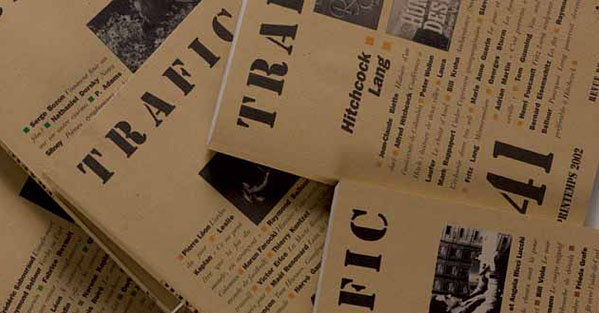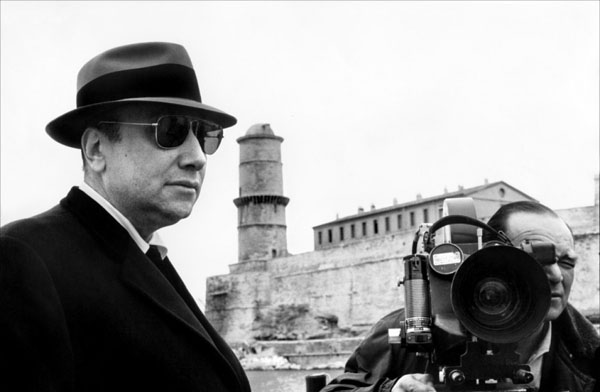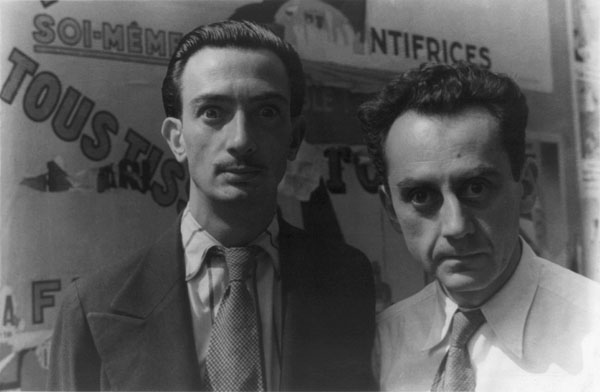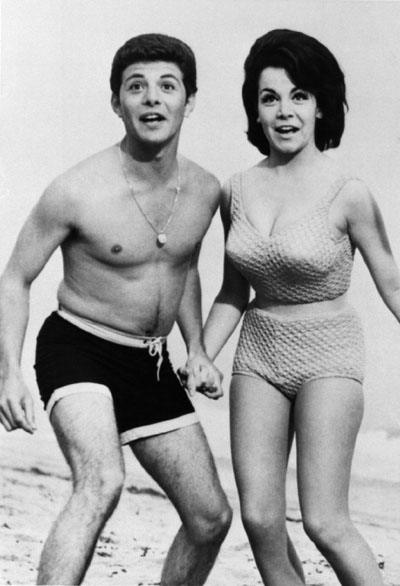You heard me—bonanza! Quite a few new issues and features have appeared since the last newsy roundup, and we begin with a tip from David Phelps, who’s contributed an interview with Federico Rossin to the inaugural issue of Cinema Comparat/ive Cinema, a bilingual journal from Barcelona. David gets Rossin to sketch an outline of the history of radical film collectives from the 1960’s to the ’80’s. The issue includes Godard discussing “Cinémathèques and the History of Cinema” in 1979 (followed up by commentary from Jean Douchet), Henri Langlois on screening Ozu in Paris back in the day (plus Pablo García Canga on Langlois the programmer), Jonathan Rosenbaum on Rivette in Context, a program that screened in “two separate incarnations” (London in 1977 and New York in 1979), Quintín‘s “Memories of a Retired Film Programmer,” an interview with Alexander Horwath, director Austrian Film Museum, another with Jean Narboni, a former co-editor of Cahiers du cinéma, Fernando Ganzo on Trafic as a sort of counter-programmer, and more.
To stick with Spanish bilingual journals for the moment, Lumière has rolled out its collection of “Highlights 2012” with lists from the likes of Nicole Brenez and Daniel Kasman and lengthier contributions such as Boris Nelepo‘s diary-like entry, Nathaniel Dorsky‘s letter to James Quandt regarding the latter’s Bresson retrospective, and Ken Jacobs‘s reflection, “Where I’m Coming From.”
The new Experimental Conversations features Maximilian Le Cain on artist, musician, and filmmaker Saidin Salkic, a third round of “Mysterious Objects from Thailand,” and, among many more reviews and interviews, Fergus Daly‘s essay, “From Method Acting to Method Viewing”: “To have watched, attentively, thousands of films, creates a unique kind of human. A new relationship is established between self and world and between perception and memory—and ensuring that these are productive relationships is the task of the discipline, the technology of the self, involved in any worthwhile cinephilia.”
I’ve only just now caught up with the Winter 2013 issue of the Virginia Quarterly, the theme of which is “Classic Hollywood.” As editor Jon Parrish Peede notes, the aim is to present “a historical lens through which to address the industry and its homegrown mythology.” Not every piece is fully available, but the issue’s spilled over to the VQR blog, where, for example, Aaron Gilbreath offers map of “the most prominent Hollywood movie ranches.”
“Our innate modesty and abhorrence of insularity, self-referencing, self-reflexivity, and, well, self-everything would normally prohibit us from publishing this piece,” writes Bright Lights Film Journal editor Gary Morris, shuffling his feet. “But we were so captivated by this tribute by one Bright Lights writer (Norm Ball) to another (Andrew Grossman) that we decided to be loosen up and go ahead and publish it.”
More reading. Jia Xu‘s interview with Tony Rayns for Festivalists “presents a miniature of Chinese cinema history, a chronicle of indie filmmaking and its assorted barriers, but most of all—it is a testimony of a life, full of love and dedication.”
When Aaron Cutler was invited to take part in Cineaste’s symposium, “Film Criticism: The Next Generation,” he saw that “the list of contributors showed that many voices I valued would not be heard from.” So, while he’s take on the first in the list of questions presented to participants, he’d handed the rest on to six other young critics.
“What makes [John] Gianvito’s cinema so important is its effectiveness,” argues David Davidson in a survey of the oeuvre. “When Gianvito’s films are screened in an auditorium they have the remarkable ability to transform the theater—a space that is often associated with escapism and entertainment—into a site of social protest.”
“As far as I know, no one has ever broached a convincing theory to explain this scene’s weirdness.” At Moving Image Source, Michael Atkinson zooms in the boarding house in Welles‘s Citizen Kane (1941) and floats a fresh theory.
Yesterday was Jean-Pierre Melville Day at DC’s.
In other news. Ray Carney’s attempt at extorting anywhere between $10K and $40K from Mark Rappaport (Carney’s bill fluctuates between each report) is finally getting some mainstream media coverage. In the Boston Globe, Geoff Edgers lays out both sides of the story and focuses as well on other shitstorms Carney’s kicked up at Boston University.
Last week, Turkish film critic Berke Göl was one of four people arrested during a protest “against the threatened closure of the Emek Theatre, one of Istanbul’s most historic movie theaters,” as Laurence Boyce reports in Cineuropa. “Many of the guests of the Istanbul Film Festival were on hand to take part in the protest including Costa-Gavras, who was on hand to receive the festival’s Lifetime Achievement Award, British director Mike Newell, Chilean screenwriter and director Marco Bechis and German director Jan Ole Gerster. There were also many prominent Turkish filmmakers and actors present including Ahmet Mümtaz Taylan, Serra Yılmaz, Cem Davran and Ezel Aka.” The BBC reports that all four have now been released (after five days) and that Costa-Gavras has “appealed to Turkish Prime Minister Recep Tayyip Erdogan to save the cinema.”
Audrey Tautou will host the opening and closing ceremonies of the Cannes Film Festival (May 15 through 26), reports the AFP. Cannes will announce the lineup for its 66th edition on April 18, and at Cineuropa, Fabien Lemercier‘s making more than a few guesses as to which films might make it in. Also: Jane Campion, already named head of the the Cinéfondation and Short Film Jury, will receive the Carrosse d’or awarded by the Society of Film Directors (SRF) during the opening ceremony of the 45th edition of the Directors’ Fortnight (May 16 through 26).
It’s a long way to February 2014, but that’s when a newly restored version of Robert Wiene‘s The Cabinet of Dr. Caligari (1920) will premiere at the Berlinale.
New York. For Hyperallergic, Alexis Clements talks with Sam Green about his new “live documentary,” The Love Song of R. Buckminster Fuller, featuring a live score by Yo La Tengo. Tonight and tomorrow at The Kitchen.
London. Film Movement in Light is a series of screenings at the National Portrait Gallery presenting the work of Man Ray (and others, including Walther Ruttmann, Hans Richter, Stan Brakhage, and Lis Rhodes). Ben Pritchard explores Ray’s work at the Quietus.
In the works. Jessica Chastain is final negotiations to join Benedict Cumberbatch, Emma Stone, and Charlie Hunnam in Guillermo del Toro’s Crimson Peak, reports Justin Kroll for Variety.
Barbra Streisand “will direct an as-yet untitled love story based on the relationship between photographer Margaret Bourke-White and author Erskine Caldwell,” reports Deadline‘s Nancy Tartaglione.
Amanda Dobbins at Vulture: “Beautiful Ruins—Jess Walter’s lovely novel about an aspiring actress, a failed novelist, a washed-up rock star, Cleopatra, the Amalfi Coast, and the Donner Party, among other things—will be made into a movie by none other than Todd Field (of In the Bedroom and Little Children fame).”
In Variety, Elsa Keslassy reports that Music Box has picked up U.S. rights to two German television mini-series that kicked up quite a bit of dust over here, The Tower (Die Turm), an adaptation of Uwe Tellkamp’s bestselling novel set in the GDR, and the more controversial Generation War (Unsere Mütter, unsere Väter), about five friends in Berlin in 1941.
Viewing. The Playlist has trailers for Asghar Farhadi’s followup to A Separation, The Past, with Bérénice Bejo and Tahar Rahim (in French, no subs), and for Steven Soderbergh’s Behind the Candelabra, with Michael Douglas and Matt Damon.
John Bennet has sent Richard Brody a clip documenting the production of Anna Karina, Sami Frey, and Claude Brasseur’s famous line dance in the café in Godard‘s Band of Outsiders (1964), and it’s got the New Yorker writer riffing on the scene as “a surprising work of modernism.”
The hour-long documentary Philosophy and the Matrix: Return to the Source “comments on how The Matrix does much more than dramatize an undergraduate thesis; it takes on questions about religious revelation and authority, parapsychology, free will and determinism, and the nature of personal identity in ways that no dry philosophical text or arcane mystical system has before,” writes Josh Jones at Open Culture.
Obits. “Annette Funicello, who won America’s heart as a 12-year-old in Mickey Mouse ears, captivated adolescent baby boomers in slightly spicy beach movies and later championed people with multiple sclerosis, a disease from which she suffered, died on Monday in Bakersfield, Calif.,” reports Douglas Martin in the New York Times. She was 70. Films such as Beach Party, Muscle Beach Party, Bikini Beach, and Beach Blanket Bingo “also starred Frankie Avalon and somehow managed to find places in their casts for Boris Karloff, Buster Keaton and Little Stevie Wonder,” noted Margo Jefferson, reviewing Funicello’s memoir, A Dream Is a Wish Your Heart Makes, for the NYT in 1994. “Fan magazines praised her as ‘a girlfriend next door who just happened to be a famous, successful movie actress and recording star.'” Writing for the Paris Review, M.J. Moore considers Funicello’s passing in light of the way Mad Men is now crossing over from the first years of the 1960’s into the years we think of first when we think of “The Sixties.”
“Raphael ‘Ray’ Silver became a producer in order to bring to the screen one of the most beautiful and influential films of the fledgling independent film movement,” writes Sandra Schulberg at Filmmaker. “The film was Hester Street, directed by Joan Micklin Silver, Ray’s wife and now, sadly, his widow.” Silver was 83 and Schulberg collects tributes.
More browsing? John Wyver‘s got another terrific roundup.
For news and tips throughout the day every day, follow @KeyframeDaily on Twitter and/or the RSS feed. Get Keyframe Daily in your inbox by signing in at fandor.com/daily.








